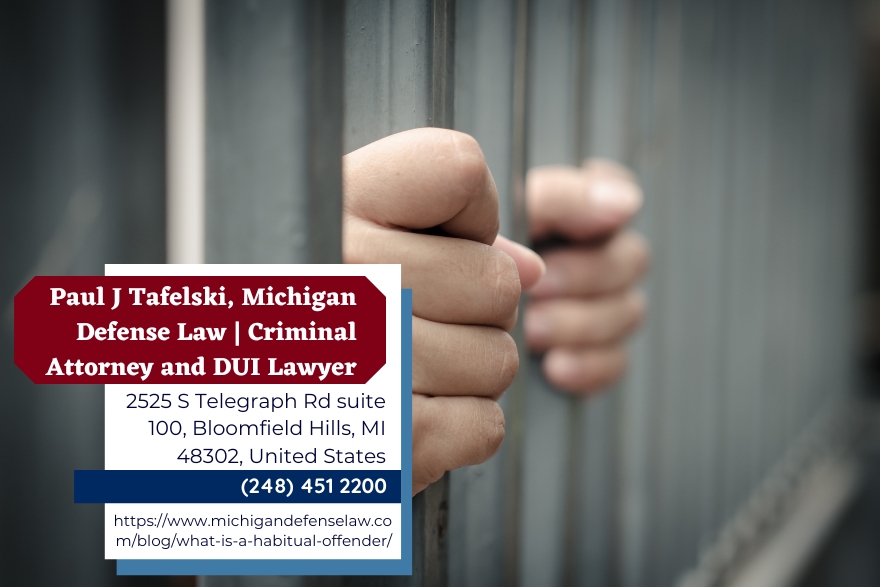Oakland County Criminal Defense Lawyer Paul J. Tafelski Discusses Habitual Offender Designation in Michigan
Oakland County criminal defense lawyer Paul J. Tafelski (https://www.michigandefenselaw.com/blog/what-is-a-habitual-offender/) of Michigan Defense Law is bringing attention to the significant consequences associated with being labeled a habitual offender in Michigan. In a recent article titled “What is a Habitual Offender?”, Tafelski outlines how repeat felony convictions can drastically increase penalties during sentencing, highlighting the importance of strong legal representation when habitual offender status is at risk.
The article explains that under Michigan law, habitual offender provisions are not separate charges but rather sentencing enhancements that apply once a person is convicted of a new felony after previous felony convictions. For those facing this status in Oakland County, working with an experienced Oakland County criminal defense lawyer is essential to understanding how these enhancements may affect a case and what defense options exist.
According to Oakland County criminal defense lawyer Paul J. Tafelski, “The stakes are incredibly high for individuals charged under Michigan’s habitual offender laws. These enhancements can lead to mandatory minimum sentences, including life imprisonment in some cases, especially under the 25-Year Habitual Offender Law.” The article emphasizes the need for a legal strategy that examines the validity and applicability of prior convictions and explores all opportunities for sentence reduction or dismissal of enhancements.
Michigan’s habitual offender law operates on a progressive scale, with penalties increasing based on the number of previous felony convictions. A second offense can lead to a sentence 1.5 times the standard maximum. A third offense can double the sentence, and a fourth or subsequent offense could result in up to life imprisonment depending on the severity of the felony. For those with major drug offenses or violent crimes in their history, the enhanced penalties can be even more severe.
The article also breaks down Michigan’s 25-Year Habitual Offender Law, which requires a minimum 25-year sentence for individuals convicted of a serious felony after three or more prior felony convictions. This law only applies when the current offense and at least one prior offense are classified as “serious” or “listed,” such as armed robbery, kidnapping, or second-degree murder. Judges are obligated to impose the minimum sentence if the criteria are met, underscoring the rigid nature of the statute.
Tafelski notes that in counties like Oakland, prosecutors frequently apply these enhancements. Once a prosecutor seeks an enhanced sentence, a formal notice detailing prior convictions is submitted to the court. The defendant’s criminal history is then considered in the sentencing phase. Because prior convictions can vary in their relevance or validity, the defense has an opportunity to challenge their use. This aspect of the law is critical for attorneys like Paul J. Tafelski, who regularly build strategies based on the specific circumstances of each case.
The implications of being labeled a habitual offender go beyond sentencing. Those affected may face limited access to probation and parole, along with stricter conditions if community-based sentencing is granted. In addition to legal penalties, the label can create obstacles in securing employment or housing, and it can significantly impact a person’s ability to reintegrate into society.
Michigan Defense Law, where Paul J. Tafelski practices, emphasizes defense strategies that address every element of habitual offender cases. This includes questioning the legitimacy of prior convictions, advocating for plea agreements when appropriate, and demonstrating mitigating circumstances such as rehabilitation efforts. In some instances, plea negotiations may lead to the removal of the habitual offender designation, offering defendants a more favorable outcome.
Legal rights for individuals facing habitual offender enhancements remain intact under Michigan law. These include the right to challenge enhancements based on expunged or invalid convictions, or those that are procedurally flawed. Gaps in time between convictions may also influence sentencing decisions under Michigan’s guidelines.
Habitual offender enhancements are not automatically applied in all felony cases, but when they are used, they pose a serious risk to freedom and future stability. Each case requires an individualized approach that considers both the legal framework and the defendant’s personal history. Paul J. Tafelski works with clients to develop legal strategies designed to reduce charges, limit sentencing exposure, and protect long-term interests.
Facing a habitual offender charge in Michigan, especially in Oakland County where these enhancements are commonly pursued, demands knowledgeable and effective representation. Michigan Defense Law provides comprehensive legal support throughout the entire process, from initial consultation through trial or plea negotiations.
Habitual offender charges come with serious consequences. With the possibility of long-term incarceration, reduced eligibility for parole, and lasting effects on personal and professional life, legal defense becomes a critical component of the response. Michigan Defense Law, led by Paul J. Tafelski, offers tailored legal strategies for those at risk of enhanced sentencing.
About Michigan Defense Law:
Michigan Defense Law represents clients across Oakland County and throughout Michigan in criminal defense matters. Led by Paul J. Tafelski, the firm focuses on navigating the legal system with a results-oriented approach. The team is committed to defending the rights of individuals facing serious charges, including those affected by habitual offender laws.
Embeds:
Youtube Video: https://www.youtube.com/watch?v=OSfHQ-qqnjg
GMB: https://www.google.com/maps?cid=7441820969606749572
Email and website
Email: [email protected]
Website: https://www.michigandefenselaw.com/
Media Contact
Company Name: Michigan Defense Law
Contact Person: Paul J. Tafelski
Email: Send Email
Phone: (248) 451-2200
Address:2525 S Telegraph Rd suite 100
City: Bloomfield Hills
State: Michigan 48302
Country: United States
Website: https://www.michigandefenselaw.com/




